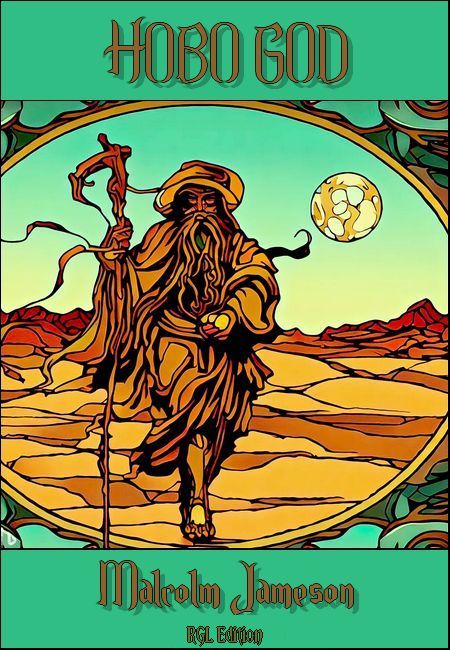
RGL e-Book Cover
Based on an image generated with Microsoft Bing
Roy Glashan's Library
Non sibi sed omnibus
Go to Home Page
This work is out of copyright in countries with a copyright
period of 70 years or less, after the year of the author's death.
If it is under copyright in your country of residence,
do not download or redistribute this file.
Original content added by RGL (e.g., introductions, notes,
RGL covers) is proprietary and protected by copyright.

RGL e-Book Cover
Based on an image generated with Microsoft Bing

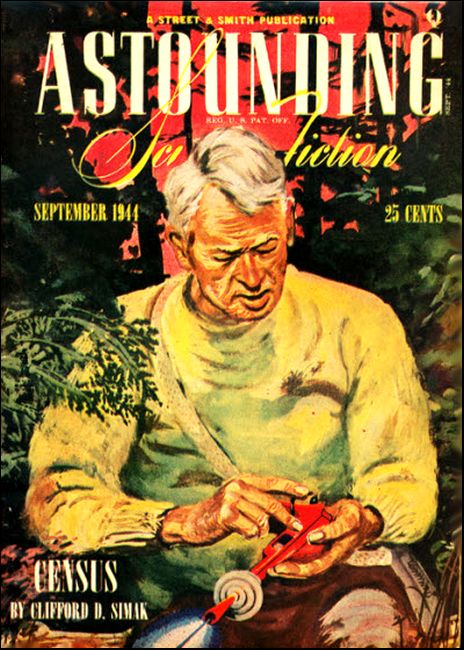
Astounding Science Fiction, September 1944, with "Hobo God"
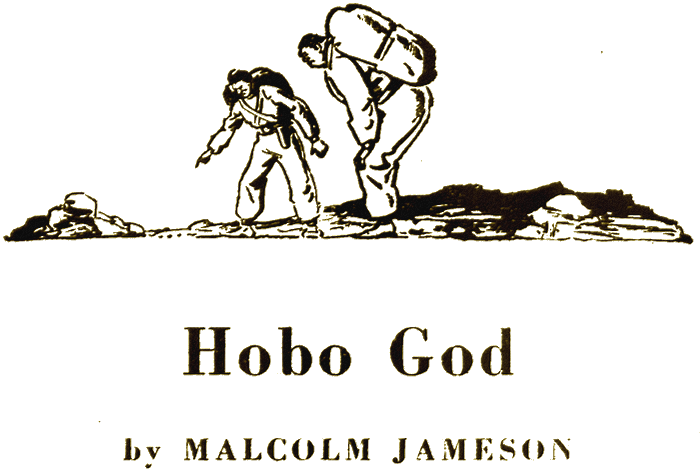
It wasn't their idea, but they stumbled on the perfect
ambassador to the
Martians. He had a way of thinking and acting that Martians understood.
1. The boss is BOSS.
2. No killin' in the tribe.
3. No wimmen-stealin'.
4. Wimmen do wimmen's work.
5. Men do men's work.
—The Five Laws of Turm.
THEY were both convicts. Atkins, naturally, was in charge. He was the smart one. The other was sent along on the theory that if the Freihofer experiment was successful, a man of brawn might be needed at the other end. So Bummy Thurmon's sentence was commuted, too. Not that it mattered much to him. So long as there was food aplenty and opportunity for unlimited sleep, anything was all right by him.
Yes, Atkins was smart. Perhaps a shade too smart. For he was the third ranking scientist in a world where scientists were top dog. But it was his misfortune to be inordinately vain and ambitious, and he wanted to be first, not second or third. That was why he attempted to steal the Hammond formula, and that is how he came to kill a guard. Either offense would have spelled ruin; taken conjointly they added up to a sentence of death. Even Atkins, powerful as be was, could not escape the usual choice—the lethal chamber now, or twenty Lunar. But it was it just that point that the Freihofer rocket was adjudged ready to ride, and Atkins, being a proper scientist, barring such offenses as theft and murder, was the logical man to go.
He accepted, of course. It was death, any way one looked at it, but not so swift and humiliating as in the chamber, or yet so long and agonizing as that on the Moon. And there was the outside chance that he might even survive awhile. In exchange he was required only to promise to keep a faithful log of the pioneer voyage and try to parachute it safely to the surface of Mars.
Thurmon had less choice in the matter. His going along was the result of the arbitrary whim of a judge. Thurmon's crime, if crime it was, was more diffuse. He was, to put it plainly, a tramp—an atavism in a world where efficiency was god. In his infancy someone had erred, or he would never have emerged from the crèche. Yet there he was, congenitally stupid and allergic to work in any form. In a highly integrated society there was simply no place for him, as one harried magistrate after another found out Their only recourse was to an ancient statute defining the misdemeanor of vagrancy, and that had been invoked just one hundred times before he came face to face with the last judge of the series. That one happened to be an adept at casuistry.
"Thurmon," he said, "I am going to give you one more chance. How would you like to sign on a ship where you won't have anything to do but eat and drink and sleep?"
"That's O.K. with me, chief," mumbled Thurmon, "so long as there ain't goin' to be no rocks to pound."
That is the way the two ill-assorted members of the Heavenly Messenger's crew were chosen, and also explains why it was that as the projectile swept in on an ever tightening spiral into the thin atmosphere of Mars, one was at the observation port, tense and alert, and the other snoring blissfully in his bunk.
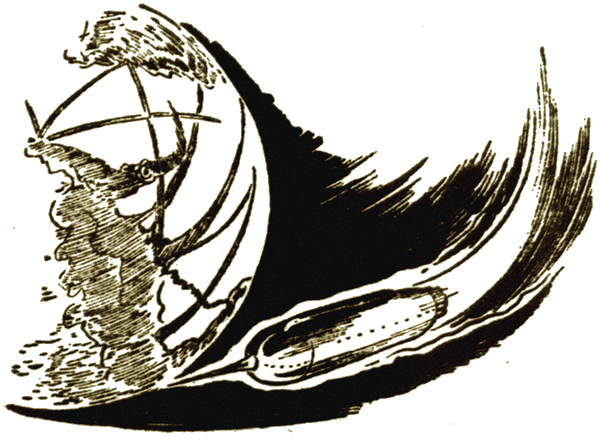
"We're going to make it!" whispered Atkins to himself, excitedly checking the trajectory for the ten thousandth time. Then he computed swiftly the rate of fall It was much too fast, as he had feared it would be despite his efforts at atmospheric braking. There was only one thing to do, and that quickly.
"Up, you lug!" he yelled to the slumbering Thurmon, "and get on your chute. We're going to jump."
"Huh?" grunted the hobo, cocking one bleary eye. But Atkins was hustling about the chamber, grabbing up last minute items. There was a large packet already packed and chuted awaiting release in a special compartment aft that contained all the essentials for a long stay in the desert. But Atkins was too forehanded to rely altogether on that. It was best to have a few things on his person. So he snatched up the only gun and buckled it onto his belt. To that he added the one remaining flashlight with a live battery, a few tins of sardines, and a canteen of water. Those, added to the ample supply of compressed food pellets carried by both men, would be sufficient to give him the edge he felt he needed. For Atkins was a mere shrimp of a man while the clumsy Thurmon was on the gigantic side. Who knew how he would behave once the pinch of desert thirst assailed him?
"Jump, you bum!" ordered Atkins, flourishing the gun.
"O.K., O.K.," growled the still sleepy Thurmon. Obeying orders was a habit with him. He never reasoned about it or questioned authority. Atkins' push helped, too. A moment later Thurmon was on his way to the sandy waste beneath, and a split second after that Atkins was following.
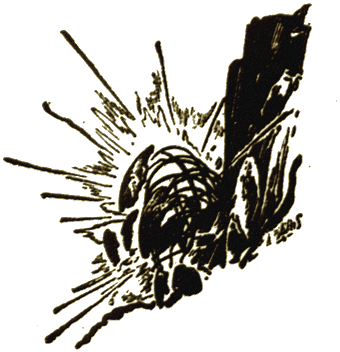
The fall was assuring slow—slow enough for them to see the end of the rocket. It crashed against a dull brown stony escarpment some three miles away, still trailing the fouled parachute that was to bear the emergency supplies to the ground. The impact was terrific. There was a blinding blast of varicolored fire, a moment of hurtling incandescent vapors, and then all that remained was a puddle of glowing slag drooling slowly down the cliff.
Atkins saw it and cursed, but was thankful for his foresight in snatching up the gun. If things on the surface were not promising, he would add Thurmon's pellet store to his own. Thurmon, as he saw it, was no loss in any man's language, on trackless Mars as little as at home. But the sands were rising up to meet him, and he tugged to maneuver for an easy landing, not from where Thurmon was already down. Atkins had already bid a fairly comprehensive view of die terrain. It was exactly as imaginative writers had often pictured it—a planet of drifting red-ash dunes on the plains between the high escarpment to the west and die ribbon-like lagoon stretching poleward on the east. The only hint of life was the broad green band that bordered the glistening canal. That meant vegetable life, surely. Perhaps there were also animals.
The place they made their landfall was about halfway to the
water. Some three miles one way the escarpment shimmered in the
heat, its face pocked by a myriad of caves. In the other
direction lay grass and shrubs and water, and halfway in the sky
above it hung the rising sun—a midget, pallid orb compared
to the fiery one on Earth.
"It'll be bitter cold tonight," said Atkins, as Thurmon shambled up, "and well probably have to hole up in one of those caves. Meantime let's go over to the canal and see what grows here."
"O.K.," grunted Thurmon. The place he was was no good at all. Just sand studded with small sharp boulders. Not a fit place to finish his nap, and nothing to eat in sight Without protest he shuffled along behind the dapper ex-scientist, only crumbling as the hot sands burned Us feet.
About a mile farther on Atkins stopped to stare at a trail that crossed their own. It came from the southwest and consisted of numerous quasi-human footprints, all headed canalward. Atkins noted the long toes and the blurred places between their traces indicating hair. The great toe was like a thumb, as well, and probably was opposable.
"There are monkey creatures here," he said to the blinking Thurmon. "That is strange."
"Uh-huh," commented his brutish companion. Thurmon was literally a lowbrow. The thick thatch of his bullet head encroached his forehead almost to his beetling eyebrows. Below that his puffy eyes and jutting jaw surmounted a generously built, barrel-chested body.
"Your kind," Atkins wanted to add, scowling at the gorilla-like figure. But there were too many uncertainties to provoke a showdown yet. Instead he added, "I hope they're edible."
"Uh-huh," agreed Thurmon, cheering appreciably. He detested pellets and dehydrated food. Never again would he fall for a judge's smooth promise.
They resumed the trek. A mile beyond they came upon something that at first appeared to be the ruins of an ancient temple. On closer inspection it turned out to be a group of petrified tree trunks, still standing. Peeping out of some of the many hummocks of sand about were the butts of other fallen ones.
"Ah, so there were once trees here," observed Atkins. "That accounts for the evolution of anthropoid types. Since they survive, we can, too." And as lie continued on toward the green he fell to thinking on probabilities. At worst the monkey people could be hunted for food. If they had intelligence, so much the better. It would be no trick at all for a super being such as Atkins to gain mastery over them. He made a face at the thought of being king of a tribe of simians, but consoled himself with the recollection of what it was said to be like on Luna. A moment later he discovered there were other animals on Mars. On the first short grass they came to there were small horselike creatures grazing, but they fled the moment they got the scent There were rabbits of a sort that jumped up and loped away, and, in the distance a beast that resembled a pig. And then, as the grasses grew higher and coarser, they sighted their first Martians.

They were distinctly humanoid. They were tall, lanky, starved-looking caricatures of men, with gaunt ribs and distended bellies, but they were no hairier than many breeds of men. Vestigial tails of some four inches in length were all that marked their recent apish extraction. The group first seen were too intent on what they were doing to notice the arrival of the out-planet strangers. They were formed in a tight circle, facing inward, yelling and jabbering excitedly. Then there was an anguished wail as their ranks broke. The object of their hunt had eluded them. A brownish animal leaped through a gap and went bounding away—a huge rabbit.
"Don't, boss, you'll scare 'em!" shouted Thurmon, but too late. Atkins already had the pistol out and was aiming it. Thurmon realized, as Atkins had, that the monkey-men had seen them and were standing in-frozen wonder. But Thurmon's antecedents were different Having had to live by his wits as a chronic panhandler he had developed an uncanny ability to gauge people's attitudes. Call it a sixth sense, telepathy, intuition or just plain hunch—whatever it was Thurmon had it to the nth degree. Those Martians were friendly, simple men—but simple. The proper approach was to amble up with a wide smile. Then ease in for the touch—oh, ever so little at a time. Rush 'em, and they'd hightail it for the hill.
That was exactly what happened. Atkins' shot was a marvel for accuracy. It was the fleeing rabbit that was his target, and he hit it fair. The animal turned one despairing flipflop in the air and lay dead. Then Atkins ran to it to retrieve it and hold it aloft for the Martians to admire. His intention was to present it to them as evidence of his superior prowess as a hunter, but by the time he turned to receive their grateful kowtows, there were no monkeymen there. They had scattered in all directions, squealing hideously.
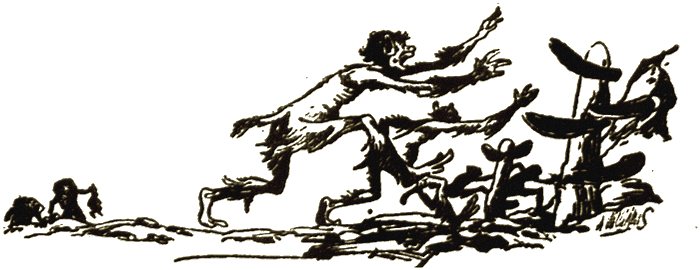
Thurmon shook his head. They'd never get anywhere that way. Atkins was too direct.
If Atkins was disappointed, he did not show it. He laid the carcass beside die trail and led on to ward the water. It would serve for their own dinner later. Meanwhile he stopped from time to time to examine the vegetation and the mL Here was rich loam, and it supported a great variety of plants, indicating clearly that Mars was not too long before a comfortably habitable planet. There were clumps of grain very much like wheat, and farther on stalks of stunted corn. Gnawed cobs and scattered shacks told the story. The band of Martians ahead had been foraging. Apparently, they emerged from the caves in the daytime to hunt their food along the canal.
It was midafternoon before they came upon the main body. The trail veered northward alongside the canal, and from the trampled state of the grass Atkins deduced that die thousands of monkeymen had traversed it like a swarm of locusts, nibbling at every head of pain that was already ripe. Where they had been nothing edible was left The tribe was evidently as ravenous as it looked. Probably the two Earthmen would have overtaken the Martians much earlier than they did except for the fact that the easygoing Thurmon went on a sort of strike.
"Doggone it," he grumbled, "my feet won't stand no more."
And he pulled off his shoes and waded out through the sedge to where he could bury and twiddle his burning toes in the soothing nod. Atkins swore at him and even threatened him with his gun, bat Thurmon wouldn't budge.
"You go on if you want to, I'm O.K. this way," was all he would answer. And since Atkins had already learned on the tedious rocket voyage that Thurmon was equipped with but two speeds—slow ahead and stop—he swallowed his impatience and waited.
Hours later the mob of Martians accepted the newcomers'
presence among them in a sort of resigned silence. Apparently the
fugitives from the hunter gang had spread the news of two strange
creatures, one of whom could kill at a great distance merely by
emitting a flash of light and making a sharp noise. The agitated
chatter of the monkey-men died as Atkins strode up to join
them.
"Now, take it easy, boss!" cautioned Thurmon again. "They'll come around all right if you don't overplay your hand."
But Atkins had his own ideas! He was bent on making a quick and overpowering impression. He stalked on into the densest part of the throng—a strange medley of males and females of every age from babe in arms to patriarch—to the tail, bearded one he took to be the head ape. There he made what he considered a friendly gesture. He extracted a can of sardines and deftly opened it, displaying the rows of silvery little fish. A great gasp rose from the ones nearest, and they drew back with fear in their eyes. Atkins calmly ate the contents of the can, but his act did not help at all. They marveled, but it was the marvel of fear. But they did not run. They dared not do that.
"Boss, I keep tellin' you. Now, these people—"
"Oh, shut up," snapped Atkins, irritably. "It doesn't matter how they react as long as I establish my superiority."
Thurmon shut up. He knew, but had neglected to speak of it, that these monkeys were fishermen as well as hunters. While he bathed his feet he noticed some, standing in a circle neck-deep in water, surrounding fish as they had tried to do the rabbit. They knew what fish were, and that they did not come in airless, waterless cans. What Atkins was doing smacked too much of magic, and while magic impressed the primitive mind, it also made it distrustful.
The sun was getting low, and soon the tribe began its march across the sands toward the hills, regardless of the presence of the strangers. At Atkins' insistence Thurmon went along. It might be several hundred below by morning, Atkins pointed out, and the vegetation about was too green to burn.
The caves were the only place where they could survive. Moreover, he wanted to study the Martians' habits through a whole day's cycle. After that he could plan his line of attack more intelligently.
"Huh," said Thurmon, but reluctantly plodded through the sands.
That night Atkins committed the ultimate error. The caves, as he had supposed, was where the Martians spent the cold hours. But there was no wood anywhere about, nor would it have helped if there had been, for Atkins was a non-smoker and had not thought to provide himself with matches. So there was nothing for it but to do as the monkeymen did, huddle up in clusters for mutual warmth.
For prestige reasons, Atkins chose the head man's cave, and therein by his error. Since he had publicly established himself as a magician, the chief's wives assumed him to be irresistible. Therefore, when he came amongst them for warmth, they acted according to their dim lights. They forsook their lord and master and huddled about the new. Thurmon growled a warning against it, for he sensed a rising aura of anger. But Atkins was proof against anything his moronic companion could urge. He certainly did not relish the nearness of the unwashed female Martians, but warmth he had to have for survival.
Thurmon glimpsed what followed from a distance. The cave was large, and the various families grouped themselves according to rules of their own. Thurmon, ever careful to avoid offense, selected a group of young bachelors with which to pool his calories. Consequently he was too far away from Atkins to render further counsel. At any rate, either to clinch his position as planetary miracle maker or for some lesser purpose, a little after it grew pitch dark Atkins tamed on his flashlight. Its sweeping rays caught scores of monkey-men in the act of preparing for slumber, and howls of outraged privacy reverberated in the cave. They sprang at him, snarling. Then the light went out, and on its heels there came the sound of scuffling, heavy grunts and labored panting. After that there was a long and ominous silence. Then later, much later, the deep breathing of profound slumber. And that, Thurmon's instinct told him, meant that his companion Atkins was no more. The Martians were a simple folk, and wanted no part of supermen.
Three days later Thurmon and the tribe parted company. Their
life was simply too strenuous for him. It did not make sense,
even to his limited mind. The pattern of it was invariable, and
not much different from that of range cattle. Never sufficiently
fed, they perforce had to follow the sun on an endless trek from
one end of the fertile belt to the other. They walked
incessantly, consuming the scanty energy snatched from the
growing plants almost as fast as they acquired it And they dared
not stop. For the cereal grasses on which they fed occurred only
at random, and nowhere was there enough in any locality to keep
them in food for more than a single day. The returns from their
inefficient hunting and fishing methods were equally precarious,
and they were burdened with the further necessity of making the
three to ten mile hike twice a day to the nearest cave.
"Nuts to that," muttered Thurmon to himself, and parted company with them amiably. For he had found that his occasional grunts conveyed to them approximately what he meant, and conversely, he could understand most of their chattering. His and their un-complex minds had much in common—they harbored few thoughts and those of the most elemental nature. The gap between their languages was not a hard one to bridge. After they had regretfully gone on, Thurmon took stock of his situation.
"All this walking, now," he told himself, "is plain silly. Why should a man wear himself out just to keep warm?"
He hated work, but he hated dragging his feet through yielding, hot sand more. So he hunted out a patch of day of the right consistency and molded it into big flat bricks, working some rushes in so it would hold together better. By nightfall he had built a mud igloo that would suit nicely, and he scoured the desert margin for dry grass and twigs and found them in plenty. Being a smoker he had matches, and therefore he passed that night quite comfortably. There was just one drawback to his contentment He had violated the primary rule of his long and parasitic life. He had done an honest day's work!
After that he rested for three days and found life good. There was no one to tell him when to get up or what to do, or to reproach him for his idleness. It was ideal, but. It was the food that bothered him. He detested the Vitalex tablets he had to live on. They had sustenance, and after that was said all had been said. He craved a more normal diet. So he undertook to do something about it There came another red letter day in his life—the day he lay ami took thought upon his future, that portion of his life he had hitherto left to Fate. But Fate could no longer help him. Here on this comfortless planet there were no friendly back doors, nor in emergencies even a hospitable jail. If anything was to be done for him, it would have to be by himself.
It was an unwelcome thought, but the more he considered it the more inescapable he saw it to be. The upshot of his unaccustomed thinking resolved itself into a simple choice. Was he going to do it the hard way, the way the monkey-men did, or was he going to cat corners? Not the hard way, certainly. And the reflection did something to Bummy Thurmon that two score competent judges had failed to do. It stirred him to action.
There was the matter of wheat and corn, the handiest food avail-able. Why gallivant from one pole to another trying to find a few grains here and there when it could all be grown in one spot? The answer was obvious. So the lumbering Thurmon roused himself from where he lounged and went hunting for heads of grain overlooked by the passing tribe.
He found bushels of it, but carrying it back to his hut in handfuls put a heavy burden on his feet There were far too many trips required. He considered that, and then sat down and wove himself a basket from some reeds. It was not a good basket, but it served, and in a few days more he had his seed. After that he drove himself to more drudgery, pulling weeds and worrying the ground with a crooked stick as he had seen farmers do with iron tools. He scattered his kernels of grain on the ground and called it a season. It had been brutally trying work, but next year there would be a crop and hardly any walking involved to garner it.
Thurmon thought he had earned a winter's rest, and started in to get it on a full-time basis. But in a few days he found the cereal diet as monotonous as the pellets. He didn't relish his corn and wheat chewed raw as the Martians did. Moreover, he had discovered that there were plentiful quantities of beans and peas about, drying in their pods. Now, if he had some way of boiling those—
The pottery he made was something worse than primitive, but after an appalling lot of breakage he contrived a pot that stood the gaff, and his comfort increased. On good days he ranged farther afield and found more food, which he stored in additional igloos he built for the purpose. Pretty soon he could dig in for the winter and call it quits.
He heaved a great sigh of relief and settled into the crazy hammock he had contrived. It was then the Big Idea hit him.
"If this is good for me," he asked himself, "why ain't it better for them monks?"
All afternoon he rocked lazily and examined that question. Surely those poor benighted Mars creatures didn't enjoy endless hiking any more than he did, and it was a cinch that none of them ever had enough to eat in his life. And they never could be sure, either, that the next day's hike would bring enough food. Wouldn't they be glad to swap their labor for less work, more food, and security? He scratched himself and chuckled.
"Sure they would!"
It was a radical concept. He, Bummy Thurmon, the shame and reproach of the civilized world, seriously contemplating work in the abstract! Now he saw that it was necessary, even dignified. That is, if someone else did it. It was an interesting idea. He now viewed work from an altogether new angle. He was looking down on it, as it were, not up at it He was the prospective employer, not the poor sucker being hooked.
The Thurmon who hit the ball fairly early the next morning was a temporarily changed man. He saw now that to induce the monkeymen to stay he would have to have something immediate to offer. He had never given thought to the thing called capital spelled with a big C, but dimly he perceived its necessity. So he cleared more ground and planted more seed so that he would have enough to share.
When the seed ran out he discovered there were still other things lacking for his comfort Meat, for one. That led to more work at first, but a little later it turned to sport. He built rabbit traps, and one fine day it occurred to him that if he could weave a basket he could also weave a seine. So he made one and then some more, and waded out into the slime to set fish traps.
In a little while there was more fish and game than he could eat He split and dried the surplus and experimented with smoking some. What emerged from his processing would never have passed a terrestrial market inspector, but for his discriminating palate it was good enough. And as the slightly saline waters of the canal receded for the winter, he found deposits of salt in flat places. Those he harvested and put away. The richest haul of the bleak winter months came the day a pig walked into one of his snares. The pork was a wonderful addition to his table, but better yet, when he skimmed the boilings he found he had lard. Thereafter he could fry things.
It must not be supposed that Thurmon worked hard ail the time.
Far from it. There were days on end when he backslid and just
slept. Nor did he ever cease to bewail his hard fate and curse
the smooth-talking judge that had consigned him to it. But he
buoyed himself up with hope—hope that he could sell his
share-work notion to the simple-minded Martian people. After all,
they were used to work, and he had solved their most pressing
problem—food and shelter.
The day the vanguard of die great tribe showed up, he met them a little beyond the northern boundary of his plantations. They were scrawnier and hungrier than ever, evidence that the pickings up above were not good, so he met them with a broad grin and truly magnificent hospitality. He had with him a pair of baskets brimming with corn and wheat. And while they ate the stuff ravenously he conveyed to them by grunts and gestures how it came to be that he had so much and what they could do to merit the same. He explained also what he meant by a house, and the useful "sunweed" he had discovered which would keep it warm.
It was no tremendous surprise to Thurmon that the majority of the tribe viewed his offer with skepticism. People were like that. The older ones shook their heads. It was too radical an innovation in their way of life. Moreover, legends were already growing up concerning the two strange aliens who had emerged from the desert, and about what befell the one who dealt openly in magic They preferred the safer course, and so went on, carefully skirting Thurmon's plantings and taking what wild grain there was between him and the desert.
The next day the conservative members of the tribe continued
their migration to the south. They dared not fall behind their
schedule a single day, for the grain ripened with the sun, and
the sun awaited no man's convenience, much less on the outcome of
wild experiments. But a half a hundred of the young and daring
elected to stay and share. What with their wives and babes and
the additional score or so of young bachelors, Thurmon was hard
put to find places for them. In the end he divided them into two
groups, one to settle beyond his borders to the north, the other
to the south, and fed them while they built their houses. It was
agreed that for the advance of food for the first pioneer year,
they would also work his own fields.
In this way was born Mars' first community, and Thurmon's second winter was much easier than the one before. Nevertheless, he had to stay awake daytimes much more than he liked. Until his apish farmers had learned their tasks, there was much supervisory work to do. But next year, Thurmon assured himself, he could commence to live the life of Reilly. This year's graduates could instruct next year's converts. Meantime new problems were arising daily, and they required decision by him whom the Martians regarded as a superman. First off, there was the question of who did what and when?
Thurmon found himself issuing decrees. It was women who drew the chores of basket and net waiving, pottery making, and the tending of fires. It was the children who scoured the desert rim for the dry stuff needed to feed the voracious "sunweed." As to the men, their lot was to gather seed, weed, plant and plow, and rob the traps and nets. And having set the notches, so to speak, Thurmon attempted to retire for the winter.
It was not to be. Not yet. He had to teach basketry and cookery, and eventually how to grind meal. None of his inventions were of a high order—they arose simply from things he missed and remembered vaguely how they might be provided. But they were hailed with enthusiasm by the tribe which he now captained. His production of a ding, for one, enabled the killing of animals too wary to be enticed into the traps. And having acquired an abundance of carcasses, it occurred to him that the skins—previously gnawed for what food value they had and thrown away could be made into garments for the cold time. But that suggestion inevitably evoked the question how? The solution cost weary Thurmon many hours of brow-knitting, but in time he popped out with the answer. He had patched his own clothes and sewed on buttons, but here was neither needle nor thread. For a needle he contributed the prong of his belt buckle, for threads he unraveled the guide lines of the 'chutes. And then a bright young monkeywoman took his notion a step further. She found the secondary uses of small bones, and how to twist weed fibers into cord.
A rare rainfall led to another chain of inventions. Thurmon's pioneer shack washed partially away, and he demanded that it be rebuilt of stone. There were stones aplenty in the desert, but their transport was the barrier. So the stoneboat was invented. It required the labor of many Martians to pull it, to the neglect of other chores. It was natural, therefore, that Thurmon should remember horses, and he told them how to catch colts.
Every year more recruits were obtained, and the passing
migratory tribes dwindled. Every year brains developed as hand
skills were acquired. Less and less did Thurmon—or the
Great Turm, as the Martians called him, since they were unable to
master complicated syllables—have to do. A generation of
eager, grateful young monkeymen took over the supervisory jobs,
coming to their venerated but slothful master only when troubled
by problems too weighty for solution by themselves. Slothful
Thurmon rarely stirred from the palace they built him save to
move to another even grander. Not since the third summer of his
coming had he permitted his dozes to be interrupted. But on days
when he was naturally wakeful, he would hold court and scatter
the pearls of his wisdom before his attentive lieutenants.
Entirely without intent or awareness, he had hit upon the formula
of great leadership. He delegated.
Were the pony-drawn stoneboats and grain drags too slow? "Hm-m-m," Turm would say, and close his eyes in thought. "Lemme see, lemme see." And after a long trance he would come out with a suggestion.
"Now wheels, if we could make 'em," he would say, "would do trick. A wheel goes somethin' like this—" and he would sketch out the basic idea of the wheels, or the lever, or the wedge, or whatever was worrying them, and leave the rest to them.
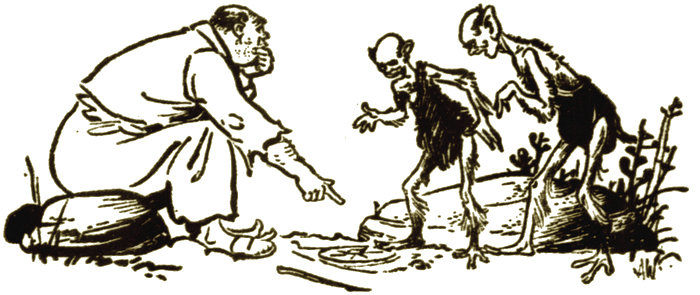
They listened and went and performed. Or when they failed and brought back their sorry attempts for approval, he would criticize. But Thurmon discouraged that sort of thing, and he dredged his memory for things people used to say to him. Many of those clichés proved invaluable to his government "God helps those who help themselves," he would say, to prod them into a solution beyond his own dull powers, and they would accept that contritely, and go out resolved to be more worthy.
The Martians labored long and hard, and it paid them. But their needs were steadily increasing, the more so because of the mounting demands of their lord and master. An unusual flood brought floating logs to them, indicating to Thurmon that somewhere on Mars was a forest. He told them in general how to build a raft. Later they crossed the canal and found the woods and brought back timber, whereupon Thurmon demanded furniture, and described it. To them it was one more revelation granted them out of Turm's vast knowledge of the wonderland from which he had come. So, under his direction, they learned to make axes from the flints of the hill caves, and later arrowheads for the marvelous machine, the bow. On marched progress.
One day, the wind being in the wrong direction, the question of sanitation intruded itself upon Thurmon's unwilling mind There was no comfort in his palace and something had to be done. A man in his position shouldn't have to—
That was when the first drainage ditch was dug. The logical
follow-up to that were more ditches—but for irrigation.
The disposal of the dirt dug up brought other ideas, and that is
how the roads and paths came to be crowned. A special class of
young Martians came into existence, a class that in another world
would have been called engineers. It is true they knew no
mathematics, but they learned a lot that could be done with dirt,
and also timber and stone.
Thurmon's craving for ease grew as more luxuries were supplied. It became tedious for him to hold court to hear the petitions brought by delegations from the distant villages. He delegated still more power, appointing local headmen and giving them authority in his name. He was instituting government, but he did not look at it that way. He was only ridding himself of bothersome detail.
It was many years after that before Turm's contented life drew
to its close. Headmen from all the villages stood hushed before
his cushy bed, while tearful concubines gazed out from behind the
slats of their secluded quarters. The great man was mortal, after
all, and was about to leave them.
"Not so bad... Mars ain't bad," Turin murmured as he composed himself for that last, interminable nap from which no devoted worshiper would rouse him. "That judge wasn't lying as much as he thought. 'Plenty of grub, lots of sleep,' he said, 'and nuthin to do.' Yep. It come out that way. But it wasn't easy goin'. I had to work one year. I had to work like hell."
It was spoken much too low to hear. The palace scribe—for Turm had taught a few the elements of writing—bent over to catch the famous man's last words.
"Yeah," said Turm, more audibly, "I had to come millions 'n' millions of miles to find it out. Hard work pays—"
The scratching of the scribe's stylus drowned out the last whispered phrase, "—but not too much of it!"
From atop the great basaltic pyramid in the heart of Azoth the
colossal image of Turm smiles in benediction on the metropolis of
Mars. Turm, the wise and patient one, stands unique among the
gods created by primitive man. Not a god of carnage and thunder
he, but one of peace and industry. Especially industry. For were
not his last words "Hard work pays." Where else in the history of
mankind did a race have such a leader? What other race compressed
within a single generation the evolutionary program of ages? The
answer is nowhere. Great was Turm, the founder of a
civilization!
Roy Glashan's Library
Non sibi sed omnibus
Go to Home Page
This work is out of copyright in countries with a copyright
period of 70 years or less, after the year of the author's death.
If it is under copyright in your country of residence,
do not download or redistribute this file.
Original content added by RGL (e.g., introductions, notes,
RGL covers) is proprietary and protected by copyright.